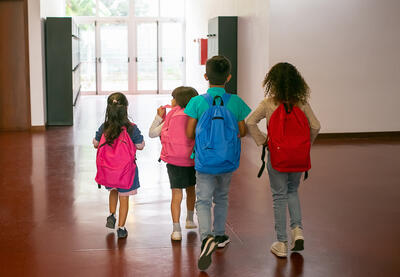As images of war and conflict fill television screens and flood the internet right now, young people need the support of parents, caregivers and educators to grapple with their emotions and to understand the events.
The October 7, 2023, terrorist attacks by Hamas against Israel and the resulting declaration of war by Israel have far-reaching effects and are especially difficult for children with connections to the region, as well as for those who have experienced war and conflict. The rise in hate crimes across the United States creates an urgent need to address issues of antisemitism and Islamophobia that may increase in schools and communities because of these recent events.
Young people want to talk about what they see happening in the world and how they feel about it, and they need guidance to have those crucial conversations in safe ways that encourage empathy and understanding. Providing safe spaces for students to learn about and discuss current events is essential—and so is helping young people to process their emotions.
Learning for Justice offers the following resources for educators, parents and caregivers to help facilitate crucial conversations and support young people.
Resources From Learning for Justice
Handle With Care: Supporting Young People During Crises
For families, educators and community members who must respond to the needs of children as a traumatizing event unfolds, this LFJ article features recommendations and resources to support you.
Understanding and Countering Antisemitism and Islamophobia in Schools
LFJ's article and toolkit provide essential overviews of Islamophobia and antisemitism and share strategies and resources for countering bigotry and fostering safer and more inclusive culture in schools and communities.
A Care Plan for Honest History and Difficult Conversations
A research-based approach for strategies of care that educators, parents and caregivers can practice when teaching honest history or engaging in difficult conversations.
Let’s Talk!
This LFJ guide provides strategies to support educators in facilitating classroom conversations about critical topics. Talking about war and conflict requires planning to ensure that conversations are safe and supportive for all students.
Speak Up at School
When having crucial conversations related to war and conflict and the managing the emotions that may surface, we must also be prepared to address issues of bias and harm when they arise. This guide offers advice to adults about how to respond to biased remarks and the use of stereotypes—and how to teach students to speak up as well.
Responding to Hate and Bias at School
Find strategies for preventing and navigating bias- or hate-related incidents in this LFJ guide. While designed primarily for school administrators, teachers, staff, counselors, students and community members also may find guidance here.
‘Never Again’ Starts with Education
This LFJ article emphasizes the importance of honest history in education and recognizes the connections between biased education and the current rise in antisemitism.
Against Hate: Media Literacy and Other Tools for Combating Extremism
Join Learning for Justice, the SPLC's Intelligence Project and Retro Report for this webinar on responding to hate and antisemitism and developing media literacy in students.
Trauma-Responsive Education
This webinar will help you gain a common understanding of trauma and how it affects both learning and relationships at school—for students and educators alike.
Additional Resources
How To Talk to Kids About Violence, Crime, and War
These tips and conversation starters from Common Sense Media can help educators and caregivers talk with children of different ages about difficult topics, including war and conflict.
Resources for Educators, Families To Discuss the Events in Israel and Gaza With Students
This resource page from the San Diego County Office of Education provides links to resources for teaching about the current events and addressing social and emotional well-being and school culture.
Fostering Civil Discourse: How Do We Talk About Issues That Matter?
This guide from Facing History & Ourselves provides ideas and tools to help educators prepare students to engage in conversations on crucial topics.
What Is Genocide?
This explainer from Facing History & Ourselves helps explain the meaning, gravity, and history of the concept and crime of genocide.
Processing Attacks in Israel and the Outbreak of War in the Region
This mini-lesson from Facing History & Ourselves aims to help students process the violence and events of the attacks in Israel and Israel's declaration of war against Hamas.
Educator Resources To Address Antisemitism in Public Schools
This page from the San Diego County Office of Education provides resources to address antisemitism in schools.
Guide to Supporting Muslim Students
This page from the San Diego County Office of Education provides resources to address Islamophobia and support Muslim students.
*Updated 04/09/2024.
Note: We will continue to update this resource page and highlight new content. We we strive to ensure our resources and any links to external content share our values and are responsible.

